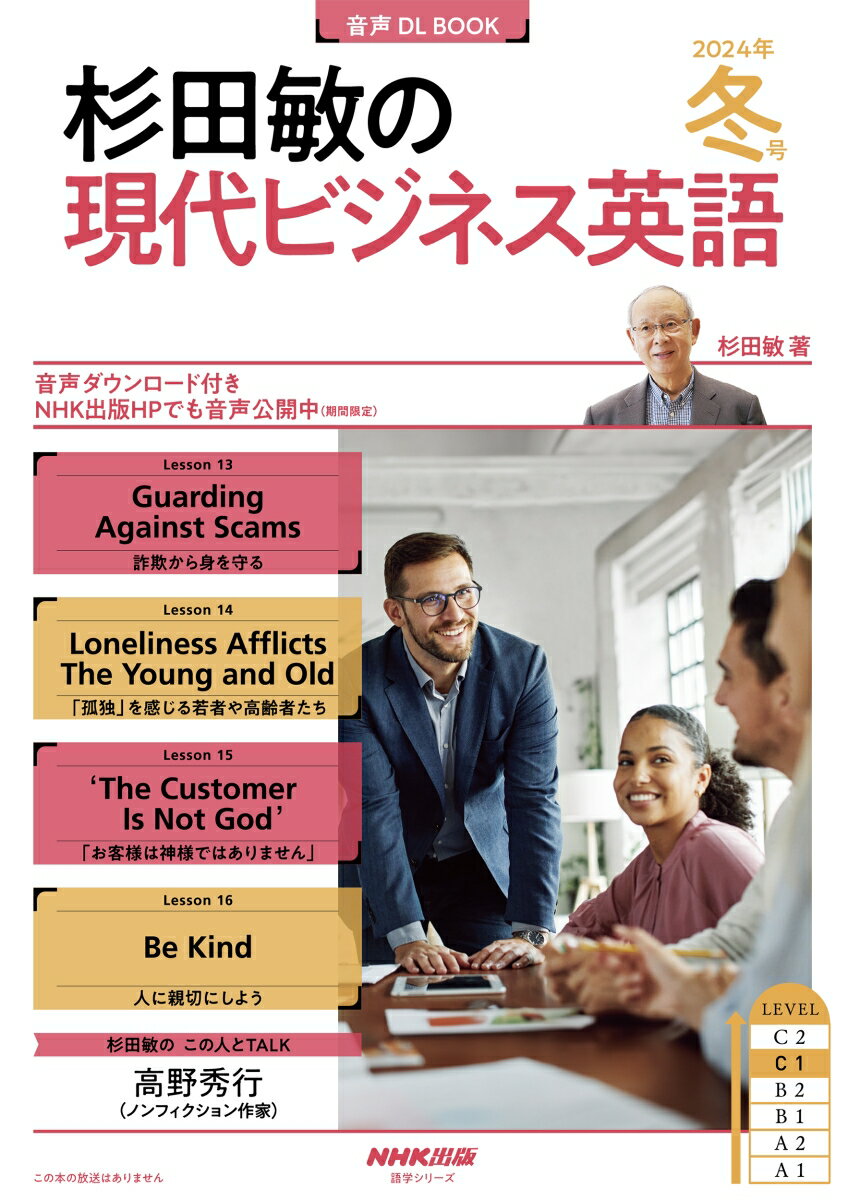どうも。
さっそく行きます。
音声は例によってここ↓から聞けます。
'The Customer Is Not God' (4)
SUMMARY
従業員を第一に、お客を第二に、株主を第3に優先する航空会社があります。従業員を大事にすると、結果として従業員はお客を大事にし、ひいては、事業も利益も、全体の幸福度も向上するというのです。またその航空会社は、お客からの苦情の数が業界でいちばん少なく、型破りの会社としても知られています。
(杉田敏の現代ビジネス英語 無料音声ページより)
VIGNETTE
Jane Rosenberg: There's this US airline that prioritizes employees first, customers second and shareholders third. They firmly believe that if they treat employees well, they will in turn treat customers well, leading to increased business profits and overall happiness.
Tim Blanco: Yeah, that airline is something else. If you write a letter of complaint about their crews' behavior, chances are you get a letter from the CEO telling you not to humiliate their employee and suggesting you fly another airline next time. It's all true.
Jane Rosenberg: That airline has the fewest customer complaints in the industry. It may seem unconventional, but their approach is apparently working really well. With around 66,000 employees and serving over 100 million customers annually, they've consistently ranked tops in customer satisfaction. They've never laid off any employees in their history of over half a century. It all stems from their "employees first" mantra which seems to have a trickle-down effect.
Janet Pulaski: During a prolonged crisis like COVID-19, emotions can really run high. Fear, anxiety, and restlessness can build up, making even minor inconveniences feel like the last straw. Unfortunately, some people take out their frustrations on the first person they encounter, often a service worker. It's tough for employees who feel trapped in such an environment. But many employees are no longer willing to tolerate abuse. And employers are stepping up to support and protect them.
WORDS AND PHRASES
There's this ~がある = there is a
口語では(中略)this +名詞が「この~」という意味ではなく単に a +名詞「1人の/1つの~」の意味になることです。つまりThere is this~はThere is a~と同じということです。
There is a ~と違い,話者の頭の中にその人物なり物が浮かんでいて,それを相手に伝えようという気持ちが出て,聞き手には~の部分が身近なものとして感じられる効果があるようです。
(毎日ひとこと:一度は使ってみたくなる,使える英語の会話表現 日替わりひとことENGLISH https://www.eigo21.com/etc/hitokoto/50.htm)
prioritizes employees first, customers second and shareholders third 従業員を第一に、お客を第二に、株主を第三に優先する。
in turn 結果として、今度は
overall happiness 全体としての幸福
something else 〈話〉すごい人[もの](英辞郎)
letter of complaint 苦情の手紙
crew's behavior 従業員の態度、乗務員の態度
chances are おそらく~だろう
"Chances are the package will reach the US next week". "Chances are", this means it's likely this, this is probably the situation, or this is probably what will happen. “Odds are" is another way to say this.
humiliate 屈辱を与える、プライドを傷つける
It's all true. 全部本当のことです。(Weblio 辞書)
customer complaint お客からの苦情
unconventional 慣例にとらわれない、型にはまらない
apparently どうやら~らしい
work well うまくいく
consistently 絶えず、いつも
"George has made consistently good investment decisions". "Consistently" refers to things that maintain the same level of content. They don't change or vary. They're steady, unwavering. And this can refer to good things and bad things. "A person can be consistently late", for example.
rank tops 第一位である
half a century 半世紀
"employees first" mantra 「従業員第一」というモットー
trickle-down effect トリクルダウン効果(富、利益、考えなどが社会などの上層から下層に徐々に浸透して行く状況)
prolonged 長引く、長期にわたる
run high 感情が高ぶる
"Tempers were running high during the meeting, so they took a break". When emotions or tempers run high, people are worked up. Their emotions are very strong, like they're amped up to a high level.
worked up 〔心配で〕心が高ぶる、興奮する、イライラする、やきもきする(英辞郎)
amp up (人)のテンションを上げさせる(英辞郎)
to a high level 高い水準まで(英辞郎)
anxiety 不安、心配
restlessness 落ち着きのなさ
minor inconveniences 些細な不便さ
take out one's frustrations on イライラを~にぶつける、欲求不満を~にぶつける
"Ashley takes out her frustrations on a punching bag at the gym". If I take out my frustrations on X, then I direct my anger at X even though it's not to blame.
encounter 思いがけず出会う、遭遇する
last straw 《the ~》〔連続的に起こる嫌な出来事のうち最新のものを指して〕我慢の限界(英辞郎)
tough つらい、むずかしい
feel trapped ~に閉じ込められたと感じる
environment 環境
be willing to ~することをいとわない、すすんで~する
no longer もはや~でない
tolerate abuse 不当な扱いを許容する、大目に見る
step up to ~しようと努力する
(日本語訳)
ジェーン・ローゼンバーグ: 従業員を第一に、顧客は第二、株主は第三に優先する米国の航空会社があります。従業員を大切にすれば、顧客も大切にするようになり、事業利益の向上と全体的としての幸福につながると確信しているのです。
ティム・ブランコ: そう、あの航空会社は別格ですよ。乗務員の態度について苦情の手紙を書いたりすると、おそらくCEOから「従業員に屈辱を与えないでくれ」という手紙が届き、次からは別の航空会社を利用するよう勧められるでしょう。全部本当のことです。
ジェーン・ローゼンバーグ: その航空会社は、顧客からの苦情が業界で最も少ないのです。型破りに見えるかもしれませんが、どうやら彼らのアプローチは実にうまくいっているようです。約6万6,000人の従業員を抱え、年間1億人以上の顧客にサービスを提供している同社は、顧客満足度でいつも第一位にランクされています。半世紀以上の歴史の中で一度も従業員を解雇したことがありません。すべては「従業員第一」というモットーからきており、それがトリクルダウン効果をもたらしているようですね。
ジャネット・プラスキ: 新型コロナのような危機が長引くと、感情が高ぶることもあります。恐怖、不安、落ち着きのなさが積み重なり、些細な不便さえも我慢の限界のように感じてしまうのです。残念なことに、最初に出会った人(多くの場合はサービス従業員)にイライラをぶつけてしまう人もいます。そのような環境に閉じ込めらたと感じる従業員はたまりません。でも、多くの従業員はもはや不当な扱いを大目に見たりしません。そして、雇用主は彼らを支援し、保護しようと努力しているのです。
遠山先生の講座は、ほぼラジオ時代と同じフォーマットの音声が聞けるんですよね。こちらもせめてward watchとquote, unquoteはやっぱり音声が欲しいなあ、とわがままを承知で個人的には思います。

